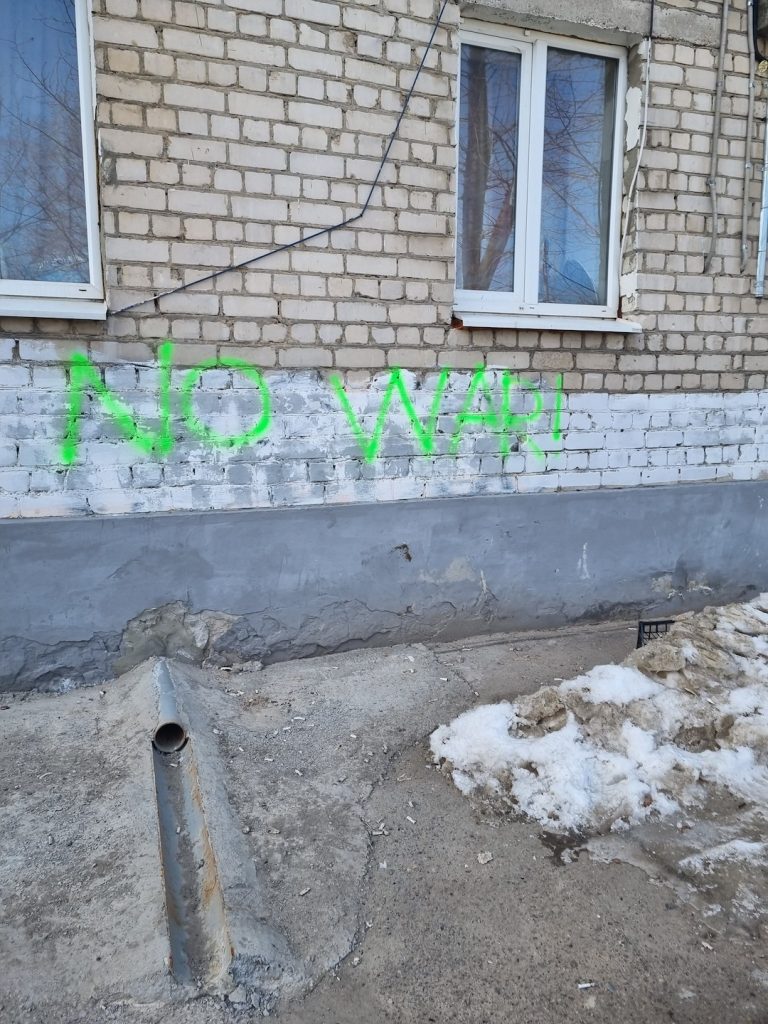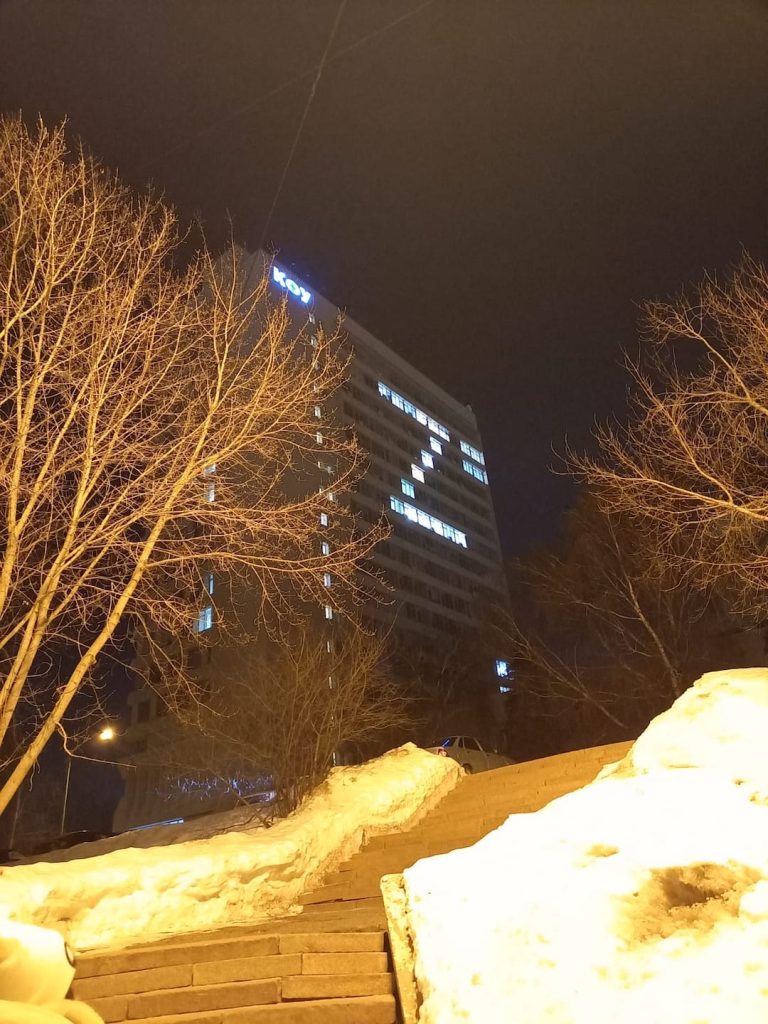Fatalism and silent opposition: Impressions of Russia at war

Trying to understand what people think and why they have formed a certain opinion. This is one of the reasons why Michèle Häfliger, a master’s student in Eastern European Studies, wanted to spend a semester at Kazan State University. For the first time, she applied in January 2020. However, the Covid-19 pandemic made it impossible to travel to Russia. Several lockdowns later, she travelled East in February 2022, finally. Then the war in Ukraine made her change her plans once again. Back in Bern, Michèle talks about what she experienced.
Even before I arrived in Kazan it was a challenge to receive the correct invitation for my visa. And the administrative challenges continued and required a lot of my time during the first two weeks after my arrival in the capital of the Tatarstan region. Therefore, I was even more excited when the semester finally started. The professors and students of the religious studies and of my Tatar language course were very welcoming and made it easy to settle in.
For one and a half weeks everything seemed normal – until the 24th of February 2022. A couple of days earlier, I had talked to my host mother, and she thought it impossible that Russian troops would invade Ukraine and start a war. I did not want to believe it either until it really happened.
Start of the war: “it was so surreal”
On the 24th of February, I was on my way to the university and quickly looked at my smartphone – a push-up news alert informed me about Kyiv being bombed. I couldn’t understand what this meant. It was beyond my imagination. In the course, the newly started war in Ukraine was not mentioned. After my class, I started writing to friends and reading every post on the SRF news feed. It was so surreal.
Only last autumn, I had last travelled to Ukraine to do research for my master’s thesis. In the West of the country, I was looking for sources to understand the role women played in society and which scope they had in the Karpat region during the interwar period. And now there was a war going on. When would I be able to return to Ukraine and what would this country then look like?
One day after the beginning of the war, international students start to leave Kazan. They return to their home countries in Europe, Central Asia, or Asia. Every day I had to say goodbye to someone. Three weeks later, there were literally only a handful of international students left. But I did not want to leave immediately. My visa did not allow me to reenter Russia once I left, so I knew departing would mean that I would not be able to return for a long time – given the political situation. And the Suisse Federal Department of Foreign Affairs (FDFA) did not recommend leaving the country. So, I took the chance to stay as long as I could and tried to understand what happened in Russia.
Bitter sanctions
Everyone felt the consequences of the sanctions against Russia quite quickly. Prices were raising, money transfers from foreign countries were put on hold and credit cards were not working anymore. There were no direct flights to Europe anymore. When you visited a shopping mall, you would see a lot of closed shops, as Western chains had terminated their activities in Russia. I had the feeling that especially for people of my generation the empty shops of McDonald’s, H&M or Starbucks were more than just closed product chains. They were a bit of lost freedom.
I talked to a friend of mine; she is a member of the Tatar minority but from a Russian-speaking family. She had planned to study a semester abroad or to travel at least in Europe. Now all her plans were dashed. “This will throw Russia back by 10 years,” she told me. No matter whether I talked to her or to my host brother and sister, the emotional reactions were similar. It is terrible what happens in Ukraine, was what they said. But what can we do? I met this fatalism also when I talked to people who had left Russia and were now living abroad for example in Antalya. What can one person do against politicians and their decisions and actions?
Fear of speaking out
Of course, fear plays an important role too. After the Russian government made it a punishable offense to use the word “war” in regard to the events in Ukraine, or to publish “fake news” about the Russian army, I myself decided not to post anything on social media anymore. I did not want to pretend that nothing had changed after the 24th of February. But I decided it to be too risky to continue to publish my thoughts on the war openly while I was in Russia.
And of course, there are also people who support the Russian government. My host mother for example told me that she was happy about the shutdown of Facebook and Instagram. This way there would be less “fake news” circulating, she told me, showing me a dubious-looking anti-Russian post. It was hard for me to hear her saying that she does not like Putin, but there are Fascists in power in Ukraine who wanted to suppress everything Russian – and it is good to clear them out.
Powerful signs
Another situation in which I found it hard to keep my distance was when I first saw the university building, illuminated with a big “Z”. The symbol Russian troops used to mark their equipment in Ukraine. And the building of the university, where I studied, openly glorified this symbol of the war.


But I saw other utterances too. I never witnessed a manifestation against the war in Kazan. But after the 24th of February, a lot of graffiti and stickers appeared in Kazan. In English or Russian, they exclaimed “No War”. So, there was an opposition even though they did not dare to speak up openly.
Especially the younger generations are well informed about what is going on. Via VPN they can still access western media and I still get their likes when I publish something on Instagram. I fear the tendency we see in western countries, to cut all links to Russia. I think we risk losing the people who are not supporting Putin and his war in Ukraine. Especially young, well-educated people feel cut off right now. In the future, there will come a time when we will want to re-establish contact, cooperation and trust. But the longer we do not talk, the harder it will be to understand each other.
When FDFA published travel advice for Russia and Michèle risked running out of money, she decided to leave. She and another Bernese student took a flight from Moscow to Tashkent – one of the few travel routes still open. From Uzbekistan, they travelled together to Bishkek (Kyrgyzstan) and to Almaty (Kazakhstan). Because of the time difference, both would go sightseeing in the morning and in the afternoon, would sit in a café with WIFI and follow their online classes, participate in meetings or write exams. As she could not re-enter Russia, Michèle subsequently returned via Istanbul to Bern. During her travels, she met a lot of people who had left Russia, because they could not support the war in Ukraine. “They told me that they felt lost. The Russia they had considered their home ceased to exist on 24 February 2022. They have lost their home country too.” Looking back, she said “I am glad that I did not leave in February. At least I had the chance to try to understand what is happening.”
Text: Lenka Fehrenbach
Images: Michèle Häfliger